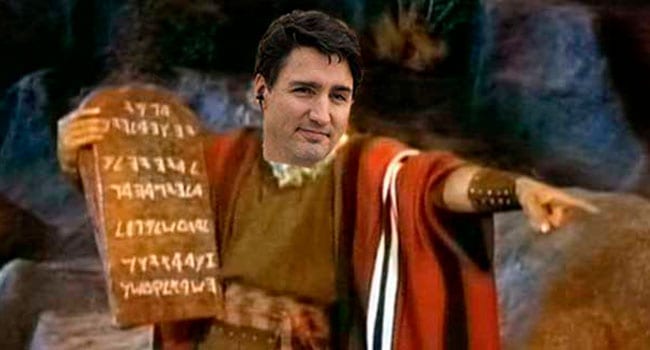 Like father, like son, the old adage goes. It’s never been truer than in the case of former prime minister Pierre Elliott Trudeau and his son Justin, Canada’s current prime minister.
Like father, like son, the old adage goes. It’s never been truer than in the case of former prime minister Pierre Elliott Trudeau and his son Justin, Canada’s current prime minister.
The parallels start with an ideological attraction to communism. Pierre was asked for his views on democracy and communism, and stated that a one-party state would be the ideal government under certain conditions. He added: “I wouldn’t be prepared to think I would be successful in arguing that (communism) for Canada at the present time. But such times might come, who knows?”
That might sound familiar.
Five decades later, Justin stated: “You know, there’s a level of admiration I actually have for China because their basic dictatorship is allowing them to actually turn their economy around on a dime.”
Of course, the reason for that direct economic power is China’s command-and-control economy, wherein the government owns or controls the vast majority of businesses.
For the Trudeaus, admiration of communism is seen in actions that diminish private sector investment in favour of public spending, along with social policies that discourage or prohibit ways of thinking not aligned with their so-called ‘progressive’ beliefs.
During the 15 years that Pierre Trudeau was prime minister, federal spending rose from 30 to 53 per cent of gross domestic product (GDP). Huge public spending overheated the economy, resulting in runaway inflation. By 1981, Canada’s prime lending rate had reached an incredible 22 per cent. The inability to meet skyrocketing interest payments caused widespread corporate and personal bankruptcies. Accessing risk capital was virtually impossible when government bonds were yielding 19 per cent.
By the time he retired in 1984, national debt had grown by 700 per cent and Canada’s international debt rating had collapsed. Canada was transformed from, financially, one of the strongest countries in the world into an economic basket case. It would be two decades before tough fiscal discipline could overcome compounding interest payments and begin to reduce the country’s real-dollar debt.
Five decades later, Justin Trudeau has Canada headed toward another fiscal calamity. After inheriting the zero-deficit balance sheet from the former government of Stephen Harper a little over two years ago, Trudeau’s budgeted 2017-18 deficit has rocketed to $18 billion, with continuing deficits forecast to add $117 billion to the national debt by 2023.
That’s reason enough to worry. But the picture is certain to get much worse, for the same reason that Pierre Trudeau’s deficits spiralled out of control: the imposition of socialist government policies on a capitalist free-market economy.
Raising marginal personal tax rates to more than 50 per cent while the United States is reducing them places Canadian companies at a competitive disadvantage in attracting and retaining skilled workers.
And it’s no longer enough just to invest and create jobs. Businesses are now expected to demonstrate that they’re adhering to the government’s social agenda, including gender equity and the hiring of ethnic minorities, in order to qualify for government contracts or support for entrepreneurial startups.
A bureaucratic new regulatory regime for resource projects reinforces Canada’s reputation as a country where it’s hard to get anything done. All of this, combined with the government’s increasingly evident anti-business attitude, has seriously eroded Canada’s formerly strong reputation as place to do business.
It comes as no surprise that, since the Justin Trudeau’s government came to power in the fall of 2015, Canada’s business investment as a share of GDP has fallen to second last among 17 industrialized OECD countries.
Canada’s economic prospects are further dimmed by the trade-hostile U.S. administration. No one expects Canada to come out of the North American Free Trade Agreement (NAFTA) renegotiations unscathed. And the downside is potentially profound.
Beyond NAFTA, there are the ad-hoc import penalties on lumber exports and threatened penalties on steel and aluminum.
These self-inflicted wounds and external threats are sure to seriously weaken Canada’s economy, making the government’s deficit projections look like a “sunny ways” fairy tale. Instead of using the extra revenue generated from the currently strong economy to balance the budget, this government has introduced new structural spending programs that are certain to see the deficits continue to climb.
A recent Fraser Institute analysis found that a “fairly serious” economic downturn could add more than $50 billion a year to the government’s deficit forecast. That would take Canada’s national debt from around $600 billion when the current government came to power to nearly $1 trillion by 2023.
And then there’s that other impossible-to-miss father/son parallel.
On Oct. 28, 1980 (a day that will live in infamy to the many hundreds of thousands employed in Canada’s oil and gas industry), Pierre Trudeau announced what’s surely the most confiscatory and interventionist industrial policy in the history of Canada. The National Energy Program (NEP) took away access to international commodity prices and imposed punitive taxes that were to be “reinvested” in oil and gas projects and companies favoured by the federal government. The NEP caused the almost complete collapse in industry investment and employment, fomenting anger and distrust that still smoulders in Alberta.
Thirty-five years later, it was Trudeau the son who enraged Albertans with a remark that revealed his ideological bias against the oil and gas industry. “We can’t shut down the oilsands tomorrow,” he said. “We need to phase them out.”
Even as the struggling industry handed over $15 billion a year in captive market price discounts to American importers, Trudeau reversed the Harper government’s approval of the Northern Gateway pipeline that would have carried oil to tide-water through northern B.C. His stated reason: the “Great-Bear Rainforest is no place for a pipeline.” But the Great Bear Rainforest hadn’t even been designated during the regulatory process (until 2016, it was just called the Central and North Coast Forest).
Meanwhile, a proposed oil pipeline to Eastern Canadian seaports became so entwined in Quebec political opposition, complicated by federal government’s decision to restart the National Energy Board regulatory hearings, that the proponent withdrew after spending $1 billion. This left only the Trans Mountain Pipeline expansion to Burnaby, B.C., which Trudeau reluctantly approved after the Alberta government agreed to impose heavy carbon taxes on its industry.
Then, just last month, the federal government announced it would disband the National Energy Board, a regulatory agency whose technical and administrative competency was admired around the world. In its place, a new mega-bureaucracy takes responsibility for all resource projects, including oil and gas, mining and nuclear. New legislation also expands the definition of the “interested persons” who have a right to participate in regulatory hearings from those “directly affected” to virtually everyone, including rabid anti-industry international non-government organizations.
As the former CEO of a company that invested tens of billions of dollars in Canadian resource projects, it’s hard to imagine why one would risk shareholder capital on such a costly and uncertain regulatory process. No wonder that my former firm, Encana, along with many other Canadian oil and gas companies, is shifting billions of dollars to the vastly more welcoming and efficient U.S. regulatory environment.
A person’s true intentions are visible not in what they say, but what they do. When Pierre Trudeau was asked how far he would go in fighting separatists, he famously replied: “Just watch me.”
Justin Trudeau won’t admit that, like his dad, his ideology is one of tax and spend, anti-business and anti-Alberta oil. But it’s perfectly clear from his actions that he is indeed his father’s son.
Just watch him.
Gwyn Morgan is a retired Canadian business leader who has been a director of five global corporations.
Gwyn is a Troy Media Thought Leader. Why aren’t you?
For interview requests, click here. You must be a Troy Media Marketplace media subscriber to access our Sourcebook.
The views, opinions and positions expressed by columnists and contributors are the author’s alone. They do not inherently or expressly reflect the views, opinions and/or positions of our publication.

